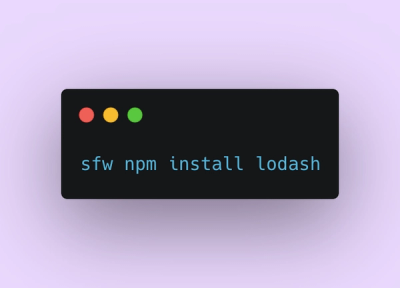
Product
Introducing Socket Firewall: Free, Proactive Protection for Your Software Supply Chain
Socket Firewall is a free tool that blocks malicious packages at install time, giving developers proactive protection against rising supply chain attacks.
@bubojs/api
Advanced tools
The API package is the heart of bubo, it creates the routes, registers the middleware and orchestrates everything, it provides decorators to easily create routes via classes and functions.
To make a controller the file that contains the class must end with "Controller.ts", a search is made in the project file names to find the different controllers
Then the Controller class must be decorated with a
@Controller()
This will result in the creation of a sub route, the name of this sub route will be the name of the controller class without the controller at the end, written in snake case and all pluralized the decorator takes an optional options object as parameter which contains two fields:
export interface ControllerParams {
repository?: BuboRepository<unknown>
overrideRouteName?: string
}
repository allows to define a repository which will allow to generate routes automatically overrideRouteName allows to define another route name than the one generated automatically
To build an automatic route you need to provide the controller with a repository (currently only sequelize is available)
The repository
import { SequelizeBaseRepository } from '@bubojs/sequelize'
import { SqlzModel } from './SqlzModel'
class MyRepository extends SequelizeBaseRepository<SqlzModel> {
constructor() {
super(SqlzModel)
}
}
export const myRepositoryInstance = new MyRepository()
The controller
import { Controller, DefaultActions, BeforeMiddleware, Post, Get, BodyFormat, Body } from '@bubojs/api'
import { myRepositoryInstance } from './MyRepository'
@Controller({ repository: myRepositoryInstance })
class DropController {}
For security reasons no automatic route is built by default, you have to activate the ones you need, for that you have to define one by one the routes by creating a field in the controller with this bias:
import { Controller, DefaultActions, BeforeMiddleware, Post, Get, BodyFormat, Body } from '@bubojs/api'
import { myRepositoryInstance } from './MyRepository'
@Controller({ repository: myRepositoryInstance })
class BaseController
{
[DefaultActions.CREATE_ONE](){}
[DefaultActions.UPDATE_ONE](){}
[DefaultActions.GET_ONE]() {}
[DefaultActions.GET_MANY]() {}
[DefaultActions.DELETE_ONE]() {}
}
These routes create a direct request to the database, you can add options to this request via our dedicated middleware (see below), or add your own options by passing them in req.$sequelize ( ⚠️ beware of the interaction between several options middlewares) So we have the following routes:
A custom route is added via a decorator:
import { Controller, DefaultActions, BeforeMiddleware, Post, Get, BodyFormat, Body } from '@bubojs/api'
@Controller()
class TestController
{
@Get('/hello_world')
greetings(){
return 'hello world'
}
}
we have just created a route that returns hello_world on address:port/test/hello_world
To pass parameters to your functions on custom routes we have developed decorators to extract data from req.query, req.params, req.body using respectively @Query('fieldName'), @Params('paramName'), @Body('fieldName') example:
import { Controller, Post, Get, Body, Query } from '@bubojs/api'
@Controller()
class MyController
{
@Get('/hello_world')
greetings(@Query('username') username: string){
return `hello ${username}`
}
}
will return hello bubo on the Get {{api}}/drop/hello_world?username=bubo
By default the route parser is set to AUTO it will accept all formats it is able to parse (RAW, TEXT, JSON, URL_ENCODED) but you can also force a format, the options are:
example:
import { Controller, Post, Body, BodyFormat } from '@bubojs/api'
@Controller()
class MyController
{
@Post('/test', { bodyFormat: BodyFormat.JSON })
test(@Body('username') username: string){
return `hello ${username}`
}
}
In this case the route will refuse anything that is not in JSON format
When you build a custom route the buboJs api will wrap your function to retrieve its result and store it in req.result, this will allow you to call other middleware afterwards to perform formatting operations for example. You can however define yourself the handler and manage directly the call of the following middleware (or not), for that you will provide to the decorator of the custom route not the function you want to execute but a constructor of the handler you want to call, it is also necessary to activate the option {rawHandler : true} in the decorator of the route example:
import { Controller, Post, Body, BodyFormat } from '@bubojs/api'
@Controller()
class MyController
{
@Get('/hello_world', { rawHandler: true, bodyFormat: BodyFormat.AUTO })
builder() {
return (req: any, res: any, next: Function) => {
res.status(200).json(`hello ${req.query.username}`)
}
}
}
FAQs
Unknown package
We found that @bubojs/api demonstrated a not healthy version release cadence and project activity because the last version was released a year ago. It has 4 open source maintainers collaborating on the project.
Did you know?

Socket for GitHub automatically highlights issues in each pull request and monitors the health of all your open source dependencies. Discover the contents of your packages and block harmful activity before you install or update your dependencies.

Product
Socket Firewall is a free tool that blocks malicious packages at install time, giving developers proactive protection against rising supply chain attacks.

Research
Socket uncovers malicious Rust crates impersonating fast_log to steal Solana and Ethereum wallet keys from source code.

Research
A malicious package uses a QR code as steganography in an innovative technique.